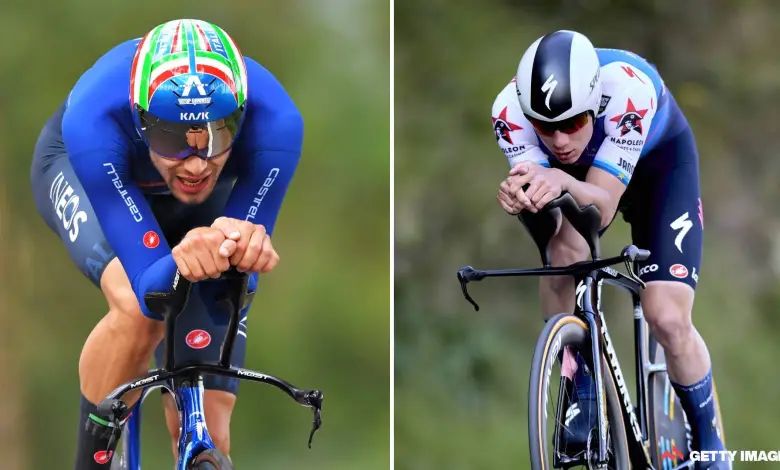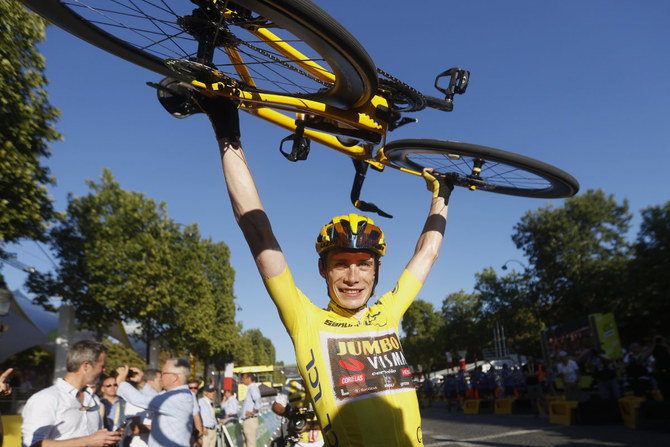After dominating the Dauphine, Jumbo-Visma rider remarks, "Both I and Roglic were the strongest."
Primo Rogli won the Criterium du Dauphiné overall, but Jonas Vingegaard won the day and perhaps made the most significant statement of the race.
I was considering that.
In his stage winner's press conference, he stated, "I believe I have a decent chance."
Last year, I was available to take Tadej Pogaar on Mont Ventoux, which sparked the belief. Then there's my progress this year and how things are going so far. In the Tour, a lot of things can happen. I'll try my best, the rest of the team will do their best, and we'll see what happens.
Even though Rogli's preparations have been limited in recent weeks, he is still a three-time Grand Tour winner with little to prove. Meanwhile, Vingegaard burst onto the forefront last year with a second-place finish at the Tour, although he is still totally young.
The fact that the 25-year-old was handed an equal leadership position for this year's Tour may have surprised some, but he proved it at the Dauphiné.
This victory has given him a lot of confidence, he remarked. I'm overjoyed.
But it wasn't simply because he'd won for the eighth time in his short career. It was the method in which he had done it.
On the last stage, Vingegaard and Rogli crossed the line arm-in-arm at the Plateau de Solaison, having rode together for the final 5km of the horse-categories climb. The ideal choreographed finish, a one-two on the stage and GC, capped after a stunning display of team mastery.
Primo promised me I'd be able to get the stage, and I'm grateful for that. He also took home the GC. "We have to be quite pleased with how things turned out," Vingegaard remarked.
Despite the widespread joy, the events of Sunday afternoon inevitably triggered the age-old result of a team with two great riders: a leadership debate. The real excitement on the Solaison, in the absence of serious competition, was which rider in the Jumbo two-up was looking more muscular and which might have the best chance at the Tour.
Despite Rogli's overall victory, Vingegaard appeared to be just as strong, if not stronger, on the climbs. Rogelio made a breakaway at Vaujany, but Vingegaard had done the work to shred the GC group and set up the attack before seemingly riding within himself in the wheel of Ben O'Connor. On two instances at Solaison, he appeared to be on the verge of distancing Rogli, the first when he made his first great acceleration after Steven Kruijswijk finished the groundwork, and the second when Rogli had to fight out of the saddle to stay in contact.
In response to the remark that Vingegaard appeared to be the stronger of the two, he said, "I don't know." Today, we were both the most powerful. So, we rode as hard as we could to the finish line.
In addition, many observers opined that his initial acceleration on Sunday was more like a full-on sprint than a gradual ramp-up of a mountain train. I wouldn't describe it as a sprint. He retorted, dismissing any suggestion that he was searching for an alone getaway. "However, we launched an attack." That was the plan all along. I'd attack when Steven backed off, and then Primo would follow me to see if we could get everyone off. was a success for us.
Vingegaard then went on to talk about his connection with Rogli, saying that the two were close and that any friction between them was improbable.
Primo and I are good friends. We like spending time with each other, our families and just the two of us. We're just having a good time. We are also concerned about one another. When Primo triumphs, I am ecstatic as well, and vice versa. If one of us wins, there will be no bitter feelings. That's why we're both great teammates. When one of us is succeeding, we are ecstatic."
Both of them won on Sunday, but it would have been intriguing to watch how things would have gone if they had raced in the higher reaches of Solaison against each other.
With a smile, Vingegaard continued, "I guess we'll never know."
Europe's Deputy Editor Patrick is an NCTJ-trained journalist with seven years of professional bike coverage. He holds a modern languages degree from Durham University and has been able to put it to good use in a multi-lingual sport, with a particular focus on riders who speak French and Spanish. Patrick became Features Editor in 2018 after joining Cycling news as a staff writer with previous job experience. He supervised significant development of the site's long-form and in-depth content.
Has been Deputy Editor - Europe since 2021, taking on additional responsibility for the site's overall content while continuing to write and travel to races worldwide despite a pandemic-induced break. Patrick spends most of his time when he is not cycling, playing or watching other sports. Patrick spends much of his time away from cycling, playing or enjoying other sports like football, tennis, trail running, and darts, but he avoids rugby.



Login To Leave a Comment